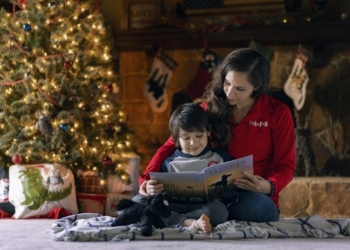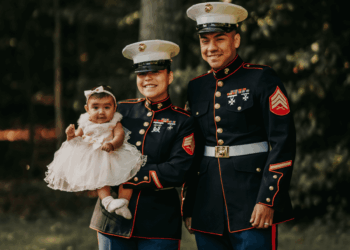A new coalition is combating food insecurity in the military after a recent survey showed service members are experiencing difficulties when trying to feed their family.
Fifteen percent of survey respondents state they have trouble getting enough food for them and their families to eat, according to 2018 data from the Military Family Advisory Network (MFAN). Dr. Shelley Kimball, the organization’s director of research, says although that number may seem small it needs to be addressed.
“Our research shows that not all military families have enough food to feed themselves and their families,” Kimball said. “When the numbers came up we were kind of shocked … From our perspective that number should be zero…and so to have anybody tell us their stories with food insecurity was heartbreaking.”
An additional 25 percent revealed they utilize food pantries in the local community when they don’t have enough to eat. Feeding America, which has 200 member food banks including near military installations, is among the coalition members. Taylor Miller, Community Outreach Manager of Foodbank of Southeastern Virginia and the Eastern Shore, says there isn’t any one factor that leads a family to this type of need.
“The thing with food hardship is, it doesn’t necessarily exist in isolation. So, people aren’t just hungry because they’re hungry. There’s lots of underlying root causes to it … in terms of lack of affordable housing, health issues, un- and underemployment, lack of transportation, financial issues, and the big thing right now is simply not having enough to make ends meet,” she said.
Miller, who is a Navy wife, initially connected to the food bank as a volunteer after her husband received orders to Norfolk. She points out that her experience has taught her that no one is immune to the issue of food insecurity.
“With many Americans living paycheck to paycheck, all it takes it that one unexpected car repair, illness, layoff or we could even lump natural disaster to that right now, to unfortunately put someone in a place where they need assistance putting food on the table for their families,” Miller said.
And experts find that these types of challenges go well beyond finances, a common misunderstanding surrounding the topic. It simply comes down to expenses exceeding income, Miller adds.
Rev. Douglas Greenaway, the National WIC Association’s (NWA) president and CEO, agrees. He says in the case of the nation’s military, his organization has long advocated for proper wages for troops so that they do not need these types of programs.
“I just want to be clear that the National WIC Association comes from a place of serving military families first and foremost, and we feel enlisted personnel should be adequately compensated for the tough work that they do so that at the end of the day families should not need to apply for this kind of support and assistance,” he said.
WIC serves as a short-term intervention program designed to influence lifetime nutrition and health behaviors in a targeted, high-risk population, according to its website. Clients receive vouchers to purchase approved food items at the grocery store which are meant to supplement dietary needs.
Greenaway wants military families to know that the program exists to advance their quality of life.
“We are a welcoming, non-judgmental program, and I think that’s the most important thing for people to remember. We are a hand up, not a hand out,” Greenaway said.
Elisabet Eppes, NWA’s Program Innovation Manager, says her organization joined forces with MFAN to ensure military families have greater access to WIC.
“For us, as the National WIC Association we would love for those (coalition) goals to be achieved of military families having better education and awareness of WIC, and clearing up some misconceptions that might exist about WIC,” she said. “Really promoting WIC in this population as something that is an empowering program and a tool for parents to use.”
Among those misconceptions facing the military demographic is what does and does not qualify as income when qualifying for WIC.
The NWA officials clarified that basic allowance for housing (BAH) should not be included as income for WIC. Additional military allowances that should not be counted, according to Eppes, are:
• Family Subsistence Supplemental Allowance (FSSA);
• Overseas Housing Allowance (OHA);
• Combat pay;
• Overseas Cost of Living Allowance (OCONUS COLA).
Other members of the MFAN coalition include Food Research & Action Center, United Way, American Red Cross, Armed Services YMCA, National Military Family Association, and USO. The group will work together to address three key areas of education on the issue and the resources available, reduction of shame for those in need, and increased access to services.
MFAN Executive Director Shannon Razsadin says her organization brought together these expert groups to ensure a tangible difference can be made for military families—including growing awareness to the issue.
“Food insecurity is not unique to military families, yet we know there are nuances of military life that need to be considered when identifying and implementing solutions. This is a complex issue, but with these organizations involved, we are poised to make a lasting impact, responsibly,” Razsadin added.
If you are a military family in need of food assistance, the list of Feeding America locations are available online.
To find a local WIC office in your area, search here.
Visit the Military Family Advisory Network to get resources in your area.
Read comments










































